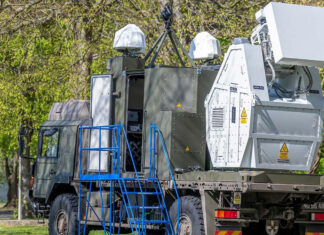Boeing will build three Block II Wideband Gapfiller Satellites (WGS) for the U.S. Air Force MILSATCOM Systems Wing. The Block II satellites will be similar to the three Block I satellites already in production. The 13-kilowatt WGS satellites are based on Boeing’s 702 bus, utilizing digital signal processors and phased array antennas. The first WGS satellite is scheduled for launch in 2007. The initial Block II will be ready for launch by the first quarter of 2011 and subsequent launches every year thereafter. WGS will augment and eventually replace the DSCS currently on station. The total value of the three satellites could sum at $1.067 billion.
Under Block II, Boeing will add a radio frequency bypass capability designed to support airborne intelligence, surveillance and reconnaissance platforms requiring ultra-high bandwidth and data rates demanded by unmanned aerial vehicles. According to U.S. Air Force Lt. Col. Adam Mortenson, WGS Block II program manager, “One WGS satellite will provide more throughput than the entire Defense Service Communications Satellite (DSCS) constellation currently on station.
















